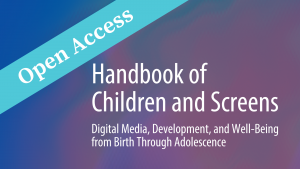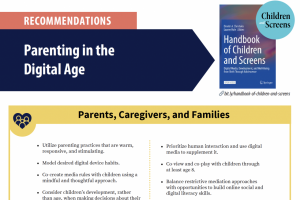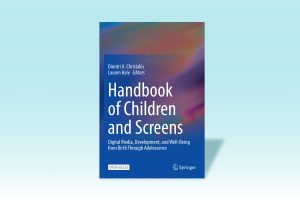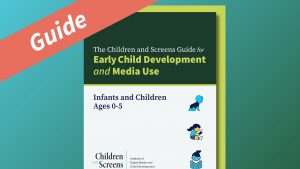
Today’s parents face a new challenge when guiding their children to adulthood: digital media use. Whether digital media use has a positive or negative impact on youth development is a topic of debate. However, it is clear that digital devices impede social development by displacing human to human interaction. Encouraging children to balance digital media use with offline experiences is, therefore, necessary for healthy development. This section of “Handbook of Children and Screens: Digital Media, Development, and Well-Being from Birth Through Adolescence” addresses these challenges and offers evidence-based suggestions to help parents navigate children’s media use. While it’s tempting to restrict children’s digital media use, the authors encourage parents to adopt active, developmentally-informed, family-centered approaches. These techniques include modeling desired behaviors, co-creating family media plans, and encouraging the development of youth autonomy. Open communication within the family and between children’s allies (e.g., clinicians, educators) is essential for creating an individualized and effective strategy for each family.
Recommendations [ALL]
The following recommendations are excerpts from the "Parenting in the Digital Age" section of the “Handbook of Children and Screens: Digital Media, Development, and Well-Being from Birth Through Adolescence." This open access publication is free to download in full or by individual chapters via the links provided following the recommendations below.
- Be an ally for parents.
- Have open discussions with families about digital device use, including information about risks, benefits, and how to manage children’s screen time.
- Tailor recommendations and interventions to families’ lived experiences.
- Apply family systems theory to each patient’s situation.
- Become informed about technoference.
- Partner with telehealth innovators to ensure quality.
- Consider family media plans as a tool for behavioral interventions.
- Utilize parenting practices that are warm, responsive, and stimulating.
- Model desired digital device habits.
- Co-create media rules with children using a mindful and thoughtful approach.
- Consider children’s development, rather than age, when making decisions about their digital device use.
- Determine how children are using digital devices, in addition to how long.
- Prioritize human interaction and use digital media to supplement it.
- Co-view and co-play with children through at least age 8.
- Balance restrictive mediation approaches with opportunities to build online social and digital literacy skills.
- Explore how digital media can be a resource for life improvement.
- Extend digital rights protections to older adolescents.
- Fund key stakeholders to further digital media literacy efforts for technoference.
- Regulate predatory practices in technology.
- Mandate the cooperation of technology companies with objective, third-party researchers.
- Support efforts to develop and implement media literacy programs.
- Adjust platforms to safely accommodate children under 13 years and provide developmentally-appropriate features.
- Regulate persuasive design features.
- Develop products that address problematic digital media use.
- Develop products to increase parental intentionality around media use.
- Include youth in development of evidence-based interventions and policy translations.
- Implement a nuanced approach in research questions and designs, recognizing the diversity in family experiences and needs.
- Ensure training in family systems theory to better facilitate the next generation of research.
Parenting in the Digital Age Section Chapters
Introduction to the Section on Parenting in the Digital Age
Stephanie M. Reich, PhD, and Sheri Madigan, PhD
Media and Parenting: Current Findings and Future Directions
Stephanie M. Reich, PhD, Fashina Aladé, PhD, Drew Cingel, PhD, Lori Takeuchi, PhD, Ronald Warren, PhD, Yalda Uhls, PhD, MBA
Putting Digital Media in Balance: The Importance of Human-to-Human Interaction for Young Children
Kathy Hirsh-Pasek, PhD, Jennifer M. Zosh, PhD, Brenna Hassinger-Das, PhD, Roberta M. Golinkoff, PhD, Yalda T. Uhls, PhD, MBA, Lisa Guernsey, PhD
Parenting and Screens During Middle Childhood
David S. Bickham, PhD, Drew P. Cingel, PhD, Amy I. Nathanson, PhD, Chad A. Rose, PhD, Colleen Russo Johnson, PhD, Erica Scharrer, PhD
Moving Beyond Fear and Restriction to Promoting Adolescent Resilience and Intentional Technology Use
Pamela Wisniewski, PhD, Jinkyung Park, PhD, Karla Badillo-Urquiola, PhD, Joy Gabrielli, PhD, Jen Doty, PhD, Heidi Hartikainen, PhD
Technoference in Parenting and Impacts on Parent-Child Relationships and Child Development
Brandon T. McDaniel, PhD, Lisa Linder, PhD, Mariek M.P. Vanden Abeele, PhD, Alison K. Ventura, PhD, Sarah M. Coyne, PhD, Rachel Barr, PhD
Family Systems Theory in the Digital Age: Reifying the Digital Level of Analysis
Dillon T. Browne, PhD, Orsolya Király, PhD, Katerina Lukavska, PhD, Sheri Madigan, PhD, Zsolt Demetrovics, PhD





